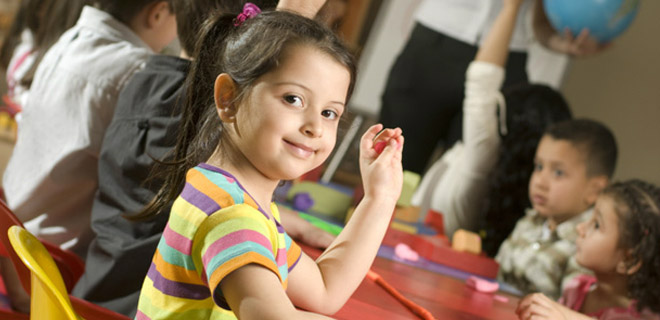We reach more than 65,000 registered users in Dec!! Register Now

"Kindness curriculum" may boost success in preschoolers
- January 30, 2015
- 1063 Views
- 0 Likes
- 0 Comment
Over 12 weeks, twice a week, prekindergarten students in Madison, Wisc. learned their ABCs. Attention, breath and body, caring practice-clearly not the standard letters of the alphabet. Rather, these 4- and 5-year-olds were part of a small study assessing a new curriculum meant to promote social, emotional and academic skills. The researchers ...
Over 12 weeks, twice a week, prekindergarten students in Madison, Wisc. learned their ABCs. Attention, breath and body, caring practice-clearly not the standard letters of the alphabet.
Rather, these 4- and 5-year-olds were part of a small study assessing a new curriculum meant to promote social, emotional and academic skills.
The researchers found that in the months following the study, kids who had participated earned higher marks and showed greater improvements in areas that predict future success than other children. The results have been published in the journal Developmental Psychology.
The project started “when we were looking at ways to possibly help children develop skills for school and academic success, as well as in their role as members of a global community,” said study lead author Lisa Flook of the University of Wisconsin-Madison. “There was a strong interest in looking at cultivating qualities of compassion and kindness.”
While similar approaches have become popular in recent years, few are backed by rigorous scientific evidence, the investigators said. They developed a curriculum to help children between the ages of 4 and 6 years learn how to be more aware of themselves and others through practices that encourage them to bring “mindful attention” to their experiences at each moment.
These practices, the researchers hypothesized, could enhance the children's self-regulation skills-such as emotional control and the capacity to pay attention-and influence the positive development of traits like impulse control and kindness.
Past studies had found that the ability to self-regulate in early childhood predicts better results later in life with health, educational attainment and financial stability, the researchers argued. Flook said early childhood is a good time to equip children with these skills, which may also help them cope with future stress.
In the new study, trained instructors taught the curriculum in diverse classrooms throughout the Madison Metropolitan School District and worked with students through hands-on activities involving movement, music and books. Each lesson was designed to give students and teachers a chance to participate in “mindfulness” practices, including activities focused on compassion and gratitude, and to take note of their experience.
For example, kids were encouraged to think about people who are helpful to them-sometimes those they may not know well, like the bus driver-and to reflect on the role these people play in their lives, Flook said.
Teachers reported one of the kids' favorite activities was a practice called “Belly Buddies,” in which they listened to music while lying on their backs, a small stone resting on their stomachs. They were asked to notice the sensation of the stone, and to feel it rising and falling as they breathed in and out.
“It's something that's so simple and it allows them to experience internal quietness and a sense of calm,” said Flook.
They also each received alphabet bracelets to wear, to help them remember their kindness curriculum ABCs. The curriculum itself is rooted in long-standing adult mindfulness-based practices but was adapted to the children's developmental ability.
The researchers measured the impact of the curriculum on sharing by using stickers the kids could choose to give away or keep. They measured the kids' ability to delay gratification by choosing one small reward to have immediately or waiting to receive a larger treat later.
The team looked at how well kids could switch from one mental task to another in a card sorting activity, where they were first asked to sort by shape, then by color, and finally, a mix of both. That's a particularly challenging skill for young kids, Flook said.
In addition to improved academics, the 30 students who went through the curriculum showed less selfish behavior over time and greater mental flexibility than the 38 kids in the control group, according to the report. Flook cautions that while the study was designed as a randomized controlled trial, additional, larger studies are needed.
Source : http://world-science.net









